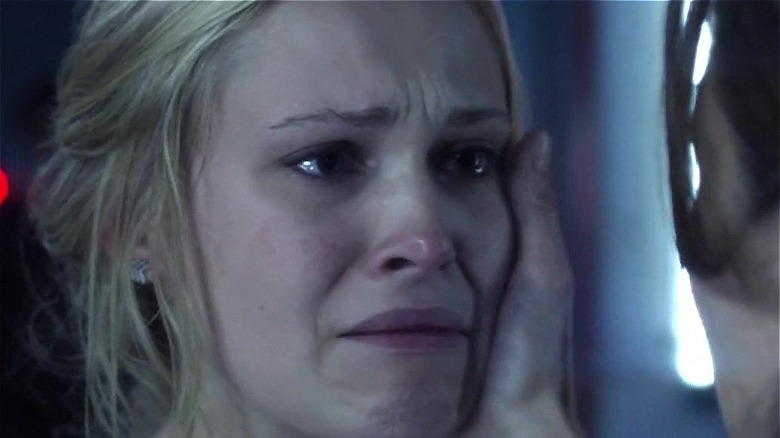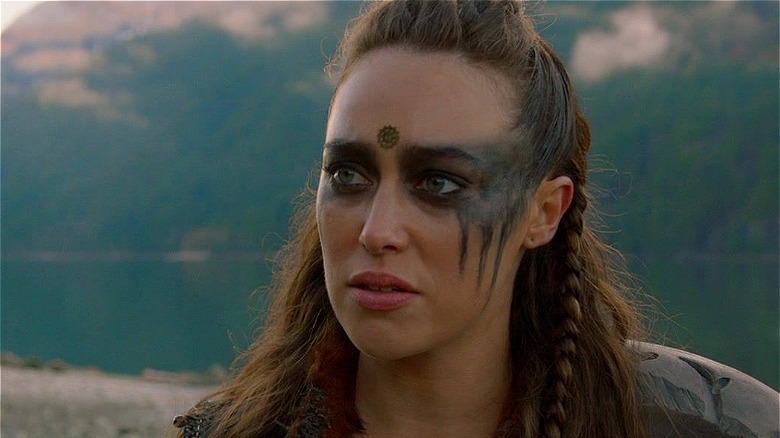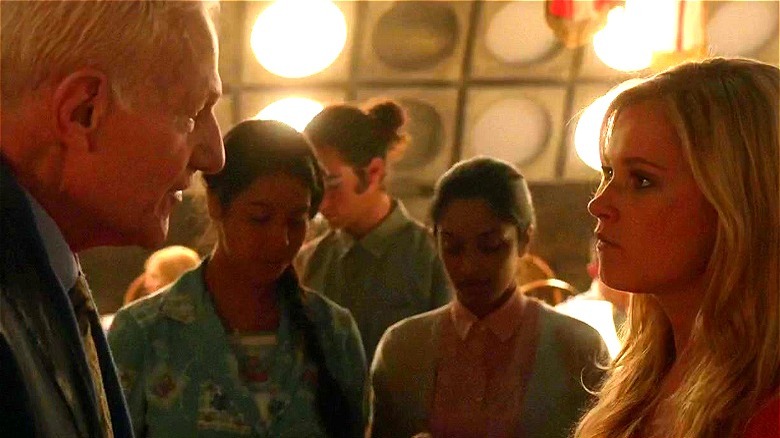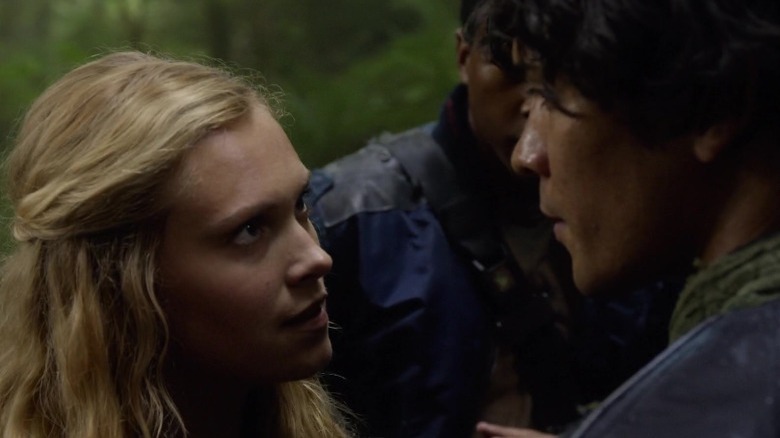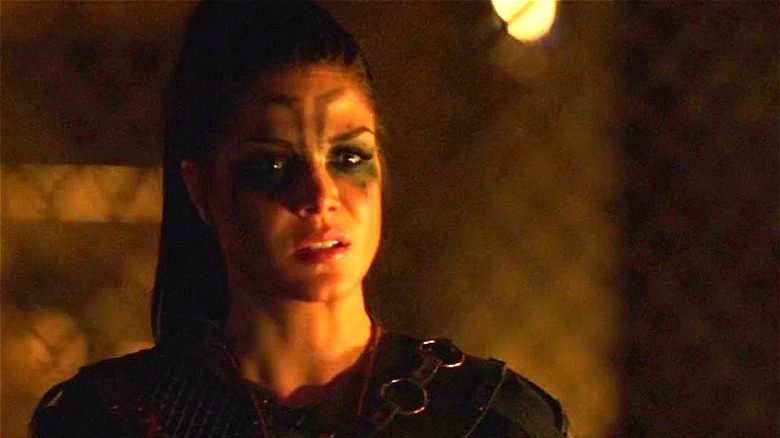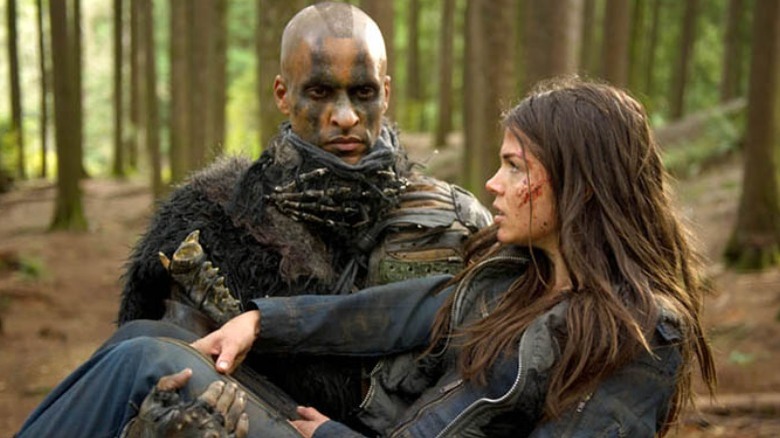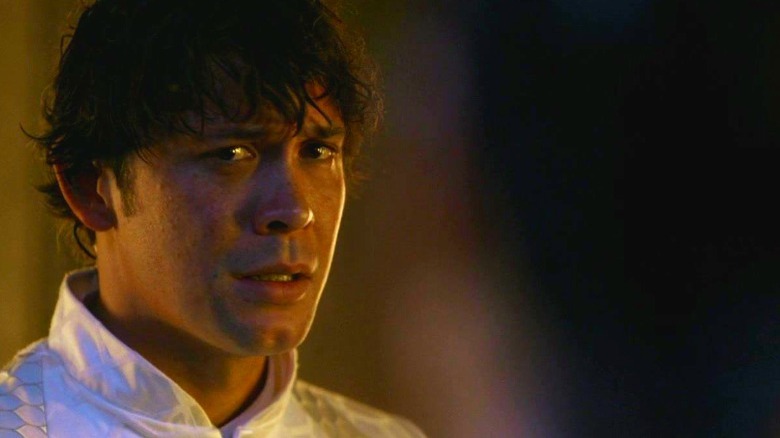The Untold Truth Of The 100
In a world where simply watching the evening news can be terrifying, it's hard to understand why we love watching post-apocalyptic stories so much. But no matter how difficult and complicated today's world becomes, there's something so compelling about the idea of scraping by with a band of post-apocalyptic survivors that keeps viewers coming back time and time again. Even if there are zombies or warring tribes, there's a strangely alluring simplicity in the idea of a deconstructed society where the struggle to merely carry on has replaced the trappings of modern life.
Whether it's a zombie tale like "The Walking Dead," a viral apocalypse like "The Stand," or a tale of life after nukes like "Battlestar Galactica," "Fallout," or "Jericho," the stories explore post-civilization humanity as the world tries to rebuild what was lost. One of the best and most ambitious stories in the genre is "The 100." This surprisingly well written and acted YA story from The CW follows a group of teenage survivors who are sent from orbit to a long-since nuked Earth to see if the planet has become livable once more. Let's take a look at the untold truth of "The 100" and what made this series one of the most imaginative sci-fi shows to ever hit the small screen.
Tributes to sci-fi legends
It's not uncommon for a TV series to give its characters meaningful names that add depth to the story and serve as hints for attentive viewers. Many of the characters in "Lost" are named for famous historical or literary figures including philosophers like John Locke, authors like C.S. Lewis, and scientists like Michael Faraday and Stephen Hawking. Likewise, many of the names in "Battlestar Galactica" derive from Greek and Roman history and mythology, carrying hidden clues about the characters they are tied to, like Hera, Apollo, and the heroic Kara Thrace, a name that echoes the warlike Thracians described in Homer's "Iliad."
"The 100" is full of meaningful character names, several of which pay tribute to famous science fiction authors. Kass Morgan, the author of the novels the TV series is based on, named her lead characters for some of her favorite authors including H.G. Wells, Arthur C. Clarke, Edward Bellamy, and Octavia Butler. Morgan drew on other sources of inspiration as well. Many fans of the series couldn't help but notice that most of the Grounders' names seem to be derived from famous present-day locations. One of the most clear-cut examples is Lincoln, an obvious reference to the Lincoln Memorial statue where he brings Octavia in the series. As a few clever Redditors noted, many less obvious names seem to also be shortened versions of famous place names, including Nia (Niagara Falls), Ontari (Ontario), and Lexa (Alexandria). The show is also filled with names of famous Roman leaders including Marcus, Gustus (Caesar Augustus), Lexa (Alexander the Great), Octavia (Octavian, Augustus Caesar's birth name), and Titus (Titus Caesar Vespasianus).
Shawn Mendes is one of the Sky People
If you have to be stuck in a post-apocalyptic nightmare, it helps to have good music around. While the delinquents that fall from the Ark don't have much to work with outside of a handful of basic survival tactics they learned in their Earth Skills class, we eventually learn that they have at least one musician among them thanks to a cameo from Shawn Mendes. The pop music star's foray into the world of Grounders and Sky People started with a simple tweet in 2015. The crooner proclaimed his instant fandom of the series, and in a later tweet, he asked the show's writers, "can i act in your tv show[?]" Although Mendes had never acted on television, producer Jason Rothenberg was happy to oblige, naming Mendes' character after an 18-year-old bottle of Macallan whiskey.
Mendes appeared in the episode "Wanheda: Part 1," dropping in to steal a bracelet and perform the Violent Femmes song "Add it Up" on the piano before getting into a tussle with an enraged Jasper Jordan, who presumably left him in stitches. Although Macallan isn't seen again after this episode, Rothenberg would later confirm the pianist was one of the few Sky People to make it through most of the series at New York Comic Con 2018 (via TV Guide). For the scrappy singer to make it that far, that means he was one of the lucky delinquents to survive the second nuclear apocalypse and end up in cryostasis aboard Eligius IV on its way to Alpha.
Grounders can't write home in Trig
Although "The 100" is only set 97 years after the nuclear apocalypse, by the time Clarke's people come into contact with the Grounders, they've already developed an entirely new language system known as Trigedasleng or "Trig." While Grounders also speak English, Trigedasleng seems to serve as a common language that the different communities of Grounders can use to communicate. If it seems strange that a new language evolved naturally in such a short time span, that's because it did not. Trigedasleng, which literally translates to mean "forest language," originally emerged as an underground language after it was created by Callie Cadogan as a child. Using her knowledge of Latin, she originally fashioned Trig as a secret code, and it evolved naturally over the decades into wider use.
In the real world, the language was created by David J. Peterson, a linguist renowned for imagining up a host of fictional languages including Dothraki, High Valyrian, and several other languages for "Game of Thrones" as well as "The Witcher," "Lovecraft Country," and numerous others. Inspired by creole and pidgin languages and whispered through the forests and trees of post-apocalyptic Earth, Trig has no written language system in the series. That means although Octavia quickly learns to proudly proclaim, "Ai laik Okteivia kom Skaikru en ai gaf gouthru klir," she would probably have trouble spelling it on a postcard and might have to revert to the Modern English, "I am Octavia of the Sky People and I seek safe passage."
The sets were often real
In the modern world of digital effects, the characters in a story can be transported to just about any setting, from the Red Forest of "12 Monkeys" to the prehistoric Earth of "Terra Nova." Sometimes the producers get it just right. Occasionally, VFX can come across as heavy-handed or even cheesy in all the worst ways. For instance, the short-lived "Once Upon a Time in Wonderland" looks like it was ripped off from a 1990s screensaver or a Trapper Keeper notebook cover. But despite all of its lush post-civilization settings, "The 100" largely avoided this pitfall by using green screen technology sparingly.
That's because Vancouver, where "The 100" was shot, is a filmmaker's haven with plenty of natural locations that are perfect for ominous television, with series like "The X-Files," "Arrow," "Supernatural," and "Battlestar Galactica" all filmed around the area. In an on-set interview with OK Magazine, Marie Avgeropoulos, who played Octavia Blake, praised the production for using Vancouver's natural scenery, commenting, "It looks like this could have been shot against a green screen but it's not. It's so beautiful." The steps of the Sky People would take the cast to such stunning locales as Spur 7 Beach and the eerie tunnels of the Britannia Mine Museum.
The show likely drew heavy inspiration from The Tribe
Over the years, there have been plenty of fantastic but lesser-known sci-fi shows that fans fell in love with but didn't achieve their full potential due to bad timing, bad marketing, or just plain bad luck. One such beloved young adult series that was fairly popular internationally but didn't click with most U.S. audiences was the 1999 series "The Tribe."
The Channel 5 sci-fi drama focuses on a group of children and teens surviving in a post-apocalyptic world where all of the adults have fallen victim to a deadly virus. The series aired for five seasons, gaining an avid following during its run. As creator Raymond Thompson explained on "The Tribe Official Podcast," he later began working on a film adaptation with Jason Rothenberg, but the project fell through. But according to a handful of Redditors who are fans of both "The Tribe" and "The 100," it looks like Rothenberg may have borrowed some inspiration from the earlier series when developing the world of Sky People and Trikru.
Both series are female-driven narratives that follow young people struggling to survive in a tribally warring post-apocalyptic world where adults are entirely missing or minimally present. Like "The Tribe," "The 100" features a brainwashing cult, forest-dwelling tribes that wear facial markings, malevolent artificial intelligence responsible for the apocalypse, and cryostasis. And yet, despite their similarities, both sci-fi shows offer their own unique look at a world where adults have failed to protect future generations from a tragedy of their own making — a theme that remains as eerily relevant today as it did in 1999.
Mount Weather is a real place
When the delinquents first arrive on Earth, their objective is to get to Mount Weather, which Chancellor Jaha tells the youths was once a military base that should be stocked with enough supplies to last 300 people a couple of years. While most of the delinquents completely blow off this directive, a handful of responsible teens decide to head off in search of the fabled mountain base. Because things in "The 100" are never easy, it takes them most of a season to make it inside the mountain. Once they do, they find an entire community of survivors straight out of "Fallout" that includes an underground water reservoir, horticultural facilities, fully functional electric systems, dormitories, and even a school.
If this sounds like a perfect place to ride out the apocalypse, that's because it's based on the actual Mount Weather Emergency Operations Center, a U.S. command facility located in Virginia. Meant to serve as a relocation site for continuity of government in case of a large-scale national disaster, the facility was first fully activated during the great Northeastern blackout of 1965, according to the online global security publication GlobalSecurity.org. The expansive facility — which has been imagined in shows like "Z Nation" (specifically Season 4, Episode 12, "Mt. Weather") and "The X-Files" (Season 9, Episodes 19-20, "The Truth") – includes an above-ground FEMA center and 200,000 square feet of underground bunker footage.
Although most Mount Weather details are top secret, according to a Federation of American Scientists (FAS) page dedicated to Mount Weather, the facility boasts a 34-ton blast door, dining and recreation areas, an emergency power plant, sleeping quarters, a hospital, a crematorium, 20 office buildings, water reservoirs, a hospital, and a TV and radio studio where the Emergency Broadcasting System is based. In case of a large-scale emergency, there is even a plan in place to move culturally important documents like the Declaration of Independence and the Bill of Rights along with priceless art from the National Archives to the legendary hideout (via TIME).
Bellamy and Clarke are married IRL
For fans of a series, it's always exciting to see the couple they ship get together IRL. After all, there's just something about knowing that the chemistry between Snow White and Prince Charming is real that makes their romance that much dreamier on "Once Upon a Time." Although Clarke and Bellamy never get together in the series, many fans hoped they would. Those folks will have to be satisfied knowing the pair do couple up in the books.
While Bellarke never happens on "The 100," they do serve as intellectual equals and frequent partners in leadership throughout the series, and their chemistry is undeniable. Actors Bob Morley and Eliza Taylor fell for each other while working on the series together and were married atop a mountain in 2019. Despite a heartbreaking miscarriage, the couple would welcome their first child into the world in March 2022. The couple can frequently be seen gushing over how much they love each other in interviews and on social media.
Actors sometimes underestimated their characters' lifespans
While it's true that some of the main characters in "The 100" seem to have pretty decent plot armor, secondary characters are rarely afforded the same luxury. And occasionally, even main characters the audience comes to know and love get unexpectedly killed off during the series' seven bloody seasons. But while the writers clearly weren't afraid to give beloved characters the ax if it served the story, they occasionally let them live longer than originally planned. A few characters that were initially meant to be written off the show early on ended up getting a reprieve and sticking around — at least, for a season or two.
Devon Bostick, who played Jasper Jordan, told Hypable that his character was originally meant to die during the pilot episode, but instead, he went on to become part of the best bromance in the series along with his BFF Monty Green. Lindsey Morgan, who played Raven Reyes, told Showbiz CheatSheet that she only expected to be on the show for five episodes before getting killed off. And according to Afictionados Podcast Network, Jessica Harmon, who played Niylah, originally expected to only appear in two episodes but ended up hanging out until the bitter end.
Post-apocalyptic authors for $200, Alex
Clarke and Bellamy might not have time for games, but their creator certainly did. In between her very busy writing career as a dystopian and science fiction novelist, author Kass Morgan, whose real name is Mallory Kass, carved out some time to appear on the classic game show "Jeopardy!" in 2022. According to Publishers Weekly, the young author, who did not even own a television for years, began dating a "Jeopardy!" superfan who got her interested in appearing on the show.
Morgan bombed her first attempt at the online contestant application but performed better the following year and landed a callback, even doing a "happy dance" after she got off the phone with the game show folks. Like the bookworm she is, Morgan prepared for her appearance on the show by doing a ton of reading. While she had a little trouble getting accustomed to using the buzzer and was initially quite nervous, she ended up having a great time on the show — even if there weren't as many literary questions as she had originally hoped for.
The Blake siblings are very different in the books
Octavia and Bellamy Blake's sibling relationship is special not just because they truly love each other, but because they're literally the only set of siblings among the Sky People. In "The 100" television series, Octavia was an illegal second child born in secret aboard the Ark and named by her brother. To remain a secret, she was hidden in the floorboards of the family's apartment during its inspections. Once on Earth, the feisty teen more than makes up for her shut-in childhood by becoming one of the fiercest warriors and one of the bravest Sky People in the group.
In the novel series, Bellamy was about 6 years old when Octavia was born, making her just a few years younger than her brother — at least until her time on Skyring ages her a decade, making her Bellamy's older kid sister. In the books, however, Octavia is only 14 years old, making her markedly younger than her big bro. And that's not the only difference. In the books, Octavia also has a girlfriend named Anna and struggles with a handful of serious problems, including addiction to drugs. And despite the draconian family planning laws, Octavia isn't Bell's only sibling in the book. Despite their distaste for each other in Wells' short time on the TV series, Wells and Bell actually become pretty close in the books — which makes sense, since it turns out they're both Jaha's sons.
The showrunner landed in hot water a few times
During their young lives, the delinquents of the Ark go through some pretty significant challenges as they wage war against the Grounders and Mount Weather and deal with a handful of post-apocalyptic apocalypses. But as it turns out, the creator of the series ended up in a few sticky situations over the years, too. While it's true that show producers often find they can't please everyone, showrunner Jason Rothenberg seemed to find himself the target of fans' ire much more often than most. During the show's seven-season run, fans were often at odds with Rothenberg, leading The Mary Sue to once remark that he "seems to have an allergic reaction to allowing his fans to have peace."
Among Rothenberg's many offenses, one of his most galvanizing was the decision to kill off Lexa immediately after she hooks up with Clarke, which many fans felt was an unapologetic example of the "bury your gays" trope. After Ricky Whittle's character Lincoln was killed off unceremoniously, the actor's mom took to Twitter to accuse Rothenberg of bullying her son. Whittle, who left "The 100" after landing a starring gig on "American Gods" as Shadow Moon, backed his mom up, explaining that he left because Rothenberg had made his job "untenable" by "professionally bullying" Whittle, essentially cutting Lincoln out of the show for personal reasons (via The Hollywood Reporter). As if that wasn't bad enough, Rothenberg would give fans one last kick in the pants by having beloved character Bellamy become barely tolerable before getting killed off during the final season.
There was almost a prequel series
As "Star Trek" and "Battlestar Galactica" fans know all too well, the only thing better than finding out a favorite series was renewed for another season is learning that there's going to be a sequel, prequel, or some other new installment in the franchise. Unfortunately, sometimes a proposed new series can end up getting stuck in development hell or scrapped altogether. This can be supremely annoying for fans who are getting hyped for a new adventure, as was the case when the long-rumored "Supernatural" spinoff "Wayward Sisters" fell through, much to the "Supernatural" faithful's collective dismay.
Fans of "The 100" know that there was a 97-year span in between the first nuclear apocalypse and the Sky People sending their delinquents down to Earth, and that's a pretty big gap. The flashback from the Season 7 episode "Anaconda" was meant to serve as a backdoor pilot for a show the creators of "The 100" had intended to fill in some of those missing years. Since the parent series was the most-watched CW show to ever air in its time slot, the prequel seemed like a solid bet. According to Deadline, the show was meant to take place in the early days after the first nuclear apocalypse and would serve as a Grounder origin story, following a group of survivors struggling to get by and rebuild their world. Unfortunately, after a couple of years in limbo, the series was eventually cut in 2021.

